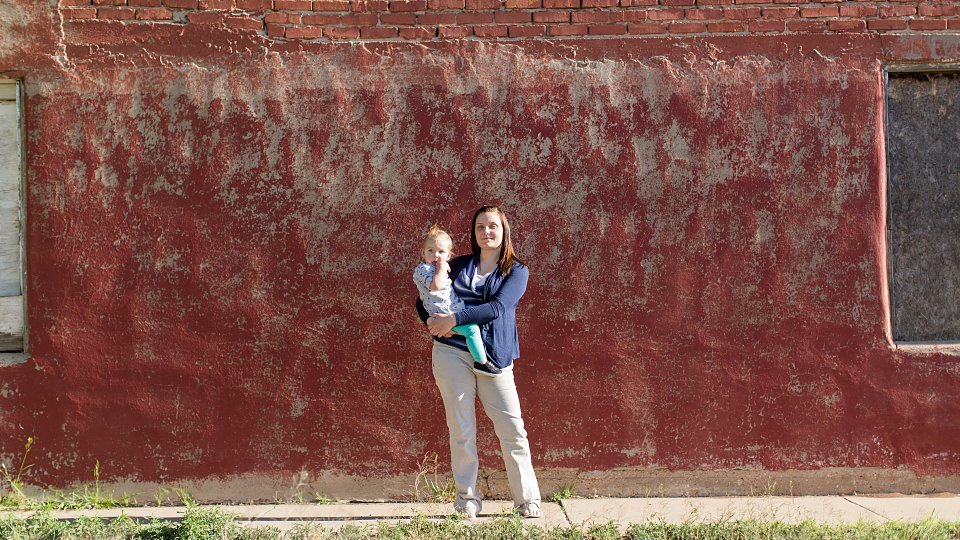Overcoming hurdles: Foster youth uses past experiences to support the foster care community
Courtney Greer is determined. She’s responsible, mature and hardworking – characteristics not often found in a 19-year-old, but after spending eight years in the foster care system, Greer was forced to grow up a bit faster than most children.
“Courtney is definitely very motivated,” says Jessica Delarosa, Buckner After Care Case Manager. “She’s determined for what she wants to do and nothing is going to hold her back.”
Greer entered foster care when she was 11 years old and lived in a total of 27 group foster homes until she graduated from high school and aged out of the foster care system. Now Greer has a 14-month-old daughter and with the help of After Care, she is going to school and providing her daughter a more stable childhood than she experienced.
Greer’s home life as a child was not ideal. Her parents had a meth lab and at times, she and her family lived in a truck in a Walmart parking lot. When they didn’t have gas, she wouldn’t go to school.
Things children normally take for granted – food, clothing, shelter – Greer was often lacking. Instead there was instability, violence and want.
When she was 11 years old, Greer was removed from her parent’s custody by Child Protective Services and put in a foster home after a SWAT team raided their house.
At first Greer was bitter about being removed, but over time, she came to realize that being in foster care improved her life.
“I was young and in the beginning, all I saw it as was that they were taking me from my mom, but it was for the best,” Greer says. “Now, I’m glad they took me. When I went into foster care, we got food, clothing, shelter, and I didn’t have that when I wasn’t in foster care.
“I learned that’s what a child should have. The way that my parents had us when we were with them, no child should have to go through that. They should never have to cry because they were so hungry. They should never have to cry because it’s cold. And in foster care, I never had to worry about any of that.”
Greer is determined that her daughter will never have to worry about that either. She diligently attends Amarillo College with plans to major in criminal justice and works part time with the Texas Department of Criminal Justice as a correctional officer.
She leans on After Care to help her succeed. After Care is a program that acts as a support system for young people who have aged out of foster care. After Care participants meet regularly with their case managers to talk about their lives and goals for the future. After Care also provides emergency assistance, helping with issues like unexpected car repairs, providing new clothes or school supplies.
Greer realized how important the After Care support was in January when her daughter, Kyleigh, was hospitalized for 13 days with a severe case of pneumonia. While in the hospital, Greer found herself alone until Delarosa, her After Care case manager, stopped by to check on them.
“They have been here for me when I needed them most,” Greer says about her After Care case managers. “That’s the biggest thing: having that support system, even with something like needing a hug. It’s as simple as that. They’re here for you, and they always will be. It’s like a whole other family because I don’t have that family.”
After Care was also able to help Greer purchase a new laptop when her computer broke just days before an Internet class was scheduled to begin.
That support is so important to Greer that she turned down the opportunity to move to Houston because she wanted to stay in the After Care program with her case managers.
Her desire now is to make other foster children aware of their opportunities so they are prepared for life after foster care.
“Recently, she has been very open to speaking to encourage other youth to take advantage of the services, especially if they don’t have anybody else to rely on and use us as their support system,” Delarosa says. “After all that she’s been through, she is a strong woman and a great role model for other foster youth.”
Greer’s motivation is to help other foster youth know that others have traveled the same road and succeeded.
“When going through the foster care system, you need that person who knows what you’re going through and is there to tell you that they have been through it, succeeded and made it out. I wish I had someone like that,” Greer says. “That’s why I want these kids to know there is a place for them – a place for just getting together with other foster kids, getting help financially as they’re able to in certain situations and support from those that understand.”
Story by Aimee Freston
Photography by Chelsea White








Comments